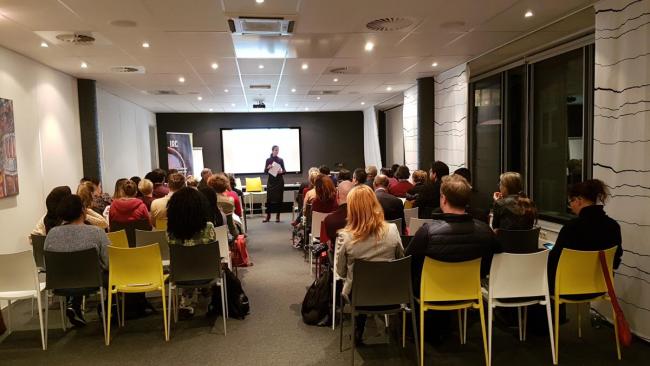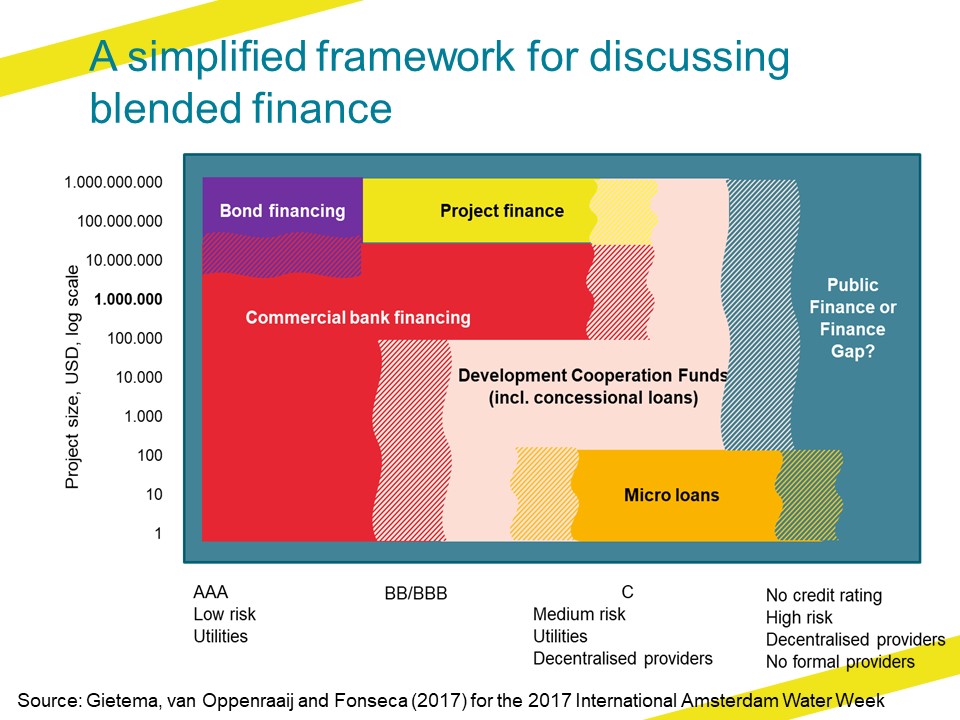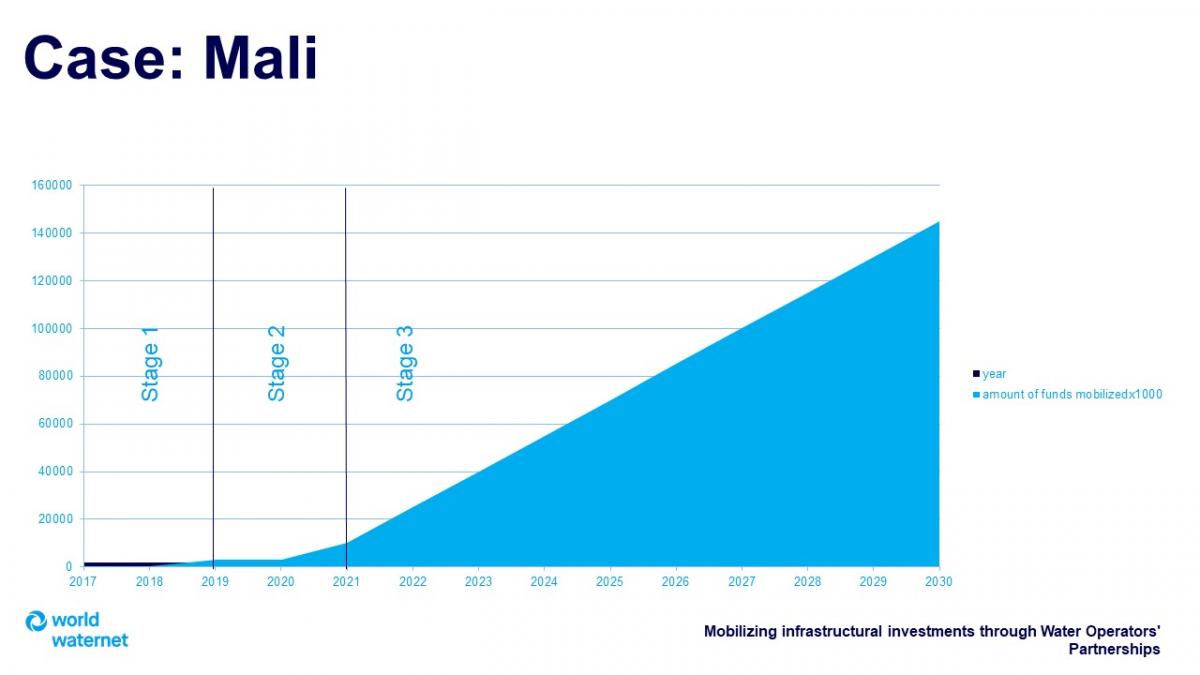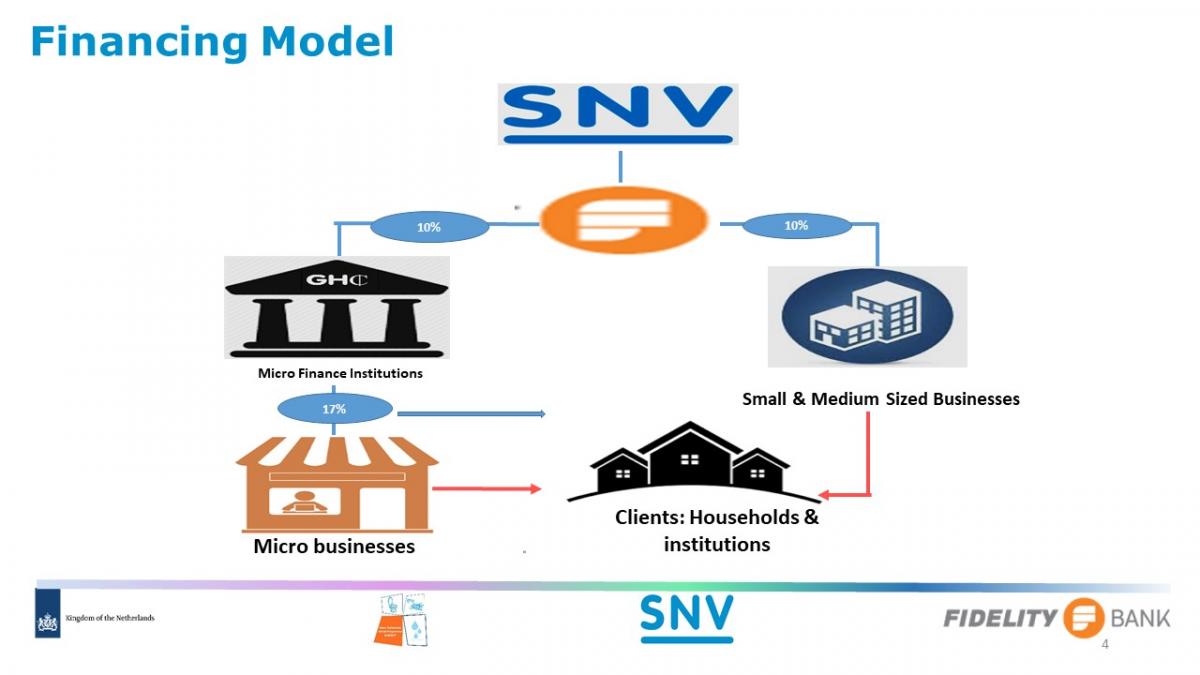De-risking investments by building capacities and subsidising interest. Report of an IRC-NWP WASH Debate.
Published on: 14/12/2018

Speed read
The potential contribution of blended finance to the water and sanitation targets set by the Dutch Ministry of Foreign Affairs was the topic of a WASH Debate jointly organised by the Netherlands Water Partnership (NWP) and IRC. The debate attracted some 60 sector professionals to The Hague on 4 December 2018 and over 300 viewers who followed or replayed the Twitter livestream. Participants engaged in a lively discussion with presenters from World Waternet, the Dutch Development Bank FMO, the Ministry of Foreign Affairs and IRC.

IRC's Catarina Fonseca opened the WASH Debate by providing a simplified definition and framework for blended finance, together with emerging themes and statistics for the water, sanitation and hygiene (WASH) sector. Watch Catarina's presentation and see her PowerPoint. For "non-dummies" she and IRC CEO Patrick Moriarty co-authored a "perspectives" paper "Blended finance beyond the hype" for the recent "OECD – GIZ Conference: Closing the gap for water in line with SDG ambitions: the role of blended finance".

A blend of public and concessional financing is being used to attract larger investments for public water supply company SOMAGEP-SA in Mali. Steven van Rossum explained how Dutch development aid supports technical assistance through a Water Operator Partnership between his organisation, World Waternet and SOMAGEP-SA (stage 1). Small investments from Dutch Development Bank FMO, represented by co-presentator Pritha Hariram, fund much needed improvements in energy efficiency and reduction of non-revenue water (stage 2). Boosting capacities, performance and credit rating of SOMAGEP-SA are seen as a prerequisite to successfully pitch for large-scale public or private investments. Watch the duo's presentation and see their PowerPoint.

Fred Smiet of the Netherlands Ministry of Foreign Affairs presented preliminary findings from a microfinance project aimed to boost water, sanitation and hygiene (WASH) services for households and institutions in Ghana. The five-year project, which started in 2015, is funded by the Netherlands Embassy in Ghana and implemented by SNV and the Fidelity Bank. The main financial instrument is subsidy on interest, lowering rates from 30% to 10-17%, reducing risks for lenders and borrowers. So far a 93% repayment rate has been achieved. Watch Fred's presentation and see his PowerPoint.
Following the three presentations participants and presenters engaged in a lively discussion on blended finance models and the role of capacity building, ecology and social inclusion.
There is enough money around but investors need assurances that the risks of investing are minimised. Both the Mali and Ghana case studies emphasise the importance of building long-term capacities of both water utility and finance institution staff. Obviously this entails more than a three-day course. Water Operator Partnerships (WOPs) generally involve long-term commitments. In the case of Mali, World Waternet's capacity building assistance de-risks FMO investments in utility performance enhancement. This in turn de-risks larger investments needed to expand WASH services to all. To retain capable staff requires that they are paid competitive wages, at least partially financed by increasing tariffs. If water utilities lack the autonomy to set tariffs and ringfence budgets to cover operational expenditure, the risks may have to be borne by the state (taxes) or development aid (transfers). For foreign investors who are exposed to currency and other political risks, there are specialised agencies such as MIGA, which provide insurance guarantees and credit enhancement.
The question was raised whether or not subsidies on interest as described in the Ghana case study, distorted local credit markets. Fred Smiet replied that there was no market to distort as no other financiers provide microfinance loans. The Ministry of Finance has sanctioned the subsidy scheme. The high repayment rate (93%) will hopefully encourage commercial lenders to offer lower interest rates.
Mali, explained Steven van Rossum, has committed to provide everyone with water within 12 years, but it does not have a real policy on how to reach the poor. Although there is a US$50 deposit requirement for household connections, per capita costs are relatively low because the average household size is ten people. The Netherlands Ministry of Foreign Affairs does offer financial instruments aimed at "leaving no-one behind" Fred Smiet informed the audience. Nevertheless, even the poorest are expected to make a financial contribution for WASH services. Catarina Fonseca talked about the paradox that the poor actually pay more for their water, for example from tankers, than the rich. She mentioned that tracking these inequalities is one of the activities undertaken by the Watershed - empowering citizens programme. For more on this topic see the report of the April 2018 WASH Debate on social inclusion.
Pritha Hariram stated that ethical financiers such as FMO require a social and environmental impact assessment before approving investments. However, even in developed countries environmental costs are seldom included in water tariffs. In Accra, Ghana, waste collection and recycling is one of the most profitable sectors, explained Fred Smiet. In the absence of public sewerage and solid waste systems, the private sector has jumped in to mitigate at least some of the environmental pollution.
Watch the full recording of the WASH Debate below.
Recorded live stream @ircwash / @nwpnederland #WASHDebate: #Blended finance: Is it all in a mix?", 4 Dec 2018 with @TabithaGerrets, @ircCatarina, Steven van Rossum of @WorldWaternet, Pritha Hariram of @FMO_development and @SmietFred of @IGG_NL https://t.co/ocT7WFE667
— dietvorst (@dietvorst) December 17, 2018
You can find the three presentations under Resources.
Acknowledgements: Livestream: Dechan Dalrymple, review/editing: Tettje van Daalen.
At IRC we have strong opinions and we value honest and frank discussion, so you won't be surprised to hear that not all the opinions on this site represent our official policy.